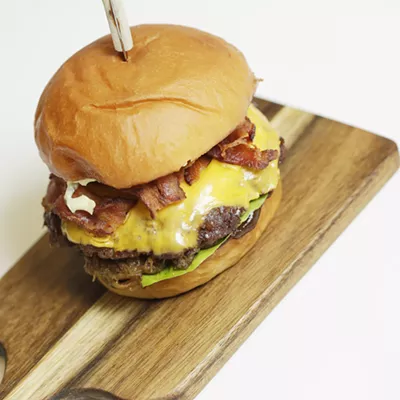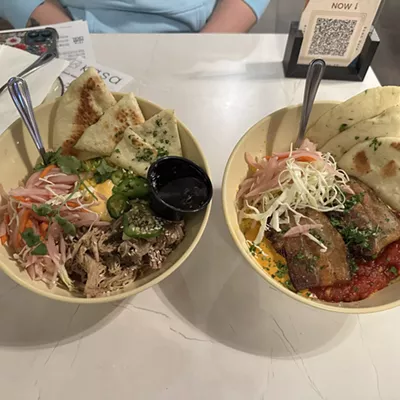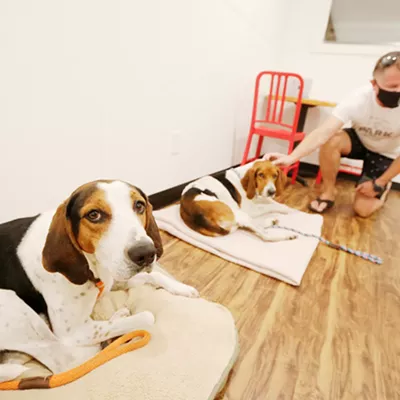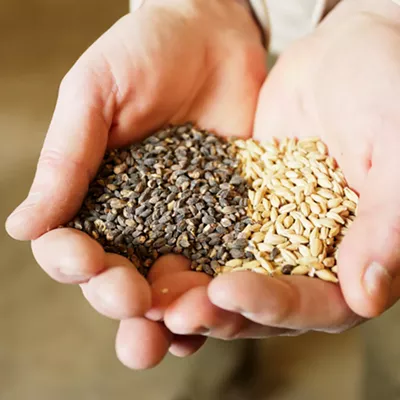The Northeast Community Center is a honeycomb of classrooms. Today, the Hillyard facility is full of giggling children and people waiting for food from the Northeast Food Bank, just a small alcove within the facility.
In the lobby, Russian grandmothers wait, leaning on walkers, in long pleated skirts, with scarves wrapped neatly around their heads. Mothers and daughters thumb through magazines, and a man with a cross around his neck waits with a shopping cart full of groceries, his eyes fixed on the floor.
The Northeast Food Bank has operated for 30 years and functions under the umbrella of the Spokane Neighborhood Action Partners (SNAP). In 2010, volunteers fed 2,239 people. In 2011, that number rose to 3,798 — approximately 20 households per day.
“It gets a little hectic around here in the middle and end of the month,” says food bank coordinator Cara Kowalski. “In the beginning of the month, people have gotten their food stamps or assistance elsewhere.”
According to the Washington Food Coalition, Washington is the 11th-hungriest state in the nation. Already in 2012, the coalition reports record-high numbers of people — nearly 2 million visits this year so far — accessing food banks, putting the emergency food system under stress.
The Northeast Food Bank is one of 20 emergency food banks in the area. These emergency outlets receive private donations, but the bulk of their food comes from state and federal commodities that are allocated through Second Harvest, the regional hunger-relief network. And some of those allocations come with bureaucratic restrictions.
Last year, the food bank received about 125,000 pounds of food from the state, and another 43,000 pounds from the federal Department of Agriculture and the Emergency Food Assistance Program (TEFAP).
The TEFAP food can only be donated to people living in specific Hillyard zip codes. This makes distributing multiple piles of food — coming from private, state and federal donations — somewhat difficult.
“We get people who don’t know where they’re supposed to go,” says Kowalski. “And we can only give people outside of our jurisdiction food from Northwest Harvest [a statewide nonprofit food bank distributor], but we can’t give them federal food.”
In contrast to the federal and state-allocated food, Northwest Harvest allows its donations to be provided to anyone in need.
“Our policy is to try to be accommodating and locate emergency resources,” says Kowalski.
Because of the need and the parameters surrounding food allocation, the Northeast Food Bank is participating in the Feinstein Food Challenge, marking the first time the food bank has relied on such a contest.
Philanthropist Alan Shawn Feinstein has pledged to divide $1 million amongst hunger-fighting agencies across the country. Between now and April 30, the more monetary and food donations Northeast Food Bank receives, the more of the Feinstein Challenge money they will get.
The Northeast Food Bank is comprised of one window and two small stock rooms. The window is covered in pamphlets about healthy eating and community resources. Behind the window is a city of cardboard boxes and the sound of rustling plastic bags.
Kowalski’s position was granted through AmeriCorps.
She and 10 volunteers dole out food five days a week. People can access the food bank by appointment only once a month. Volunteers hand out three to five days’ worth of food, including canned soup, rice, beans, eggs, apples and some vegetables.
“We are an emergency food bank, which means [people] really need this,” Kowalski says. “We understand there is a stigma surrounding emergency food assistance. No one wants to be in a position where they have to come to the food bank.”
Jim Funk, 55, has soft blue eyes, a friendly moustache and an even friendlier demeanor. He’s lived in Hillyard for more than 20 years, but he didn’t know about the food bank until six months ago.
His neighbor mentioned it when he went weeks without employment, then months, then a year.
“I didn’t go on unemployment right away, but I probably should have,” Funk says. “I just didn’t feel good about taking unemployment so I went through my savings first.”
Funk lost his job in the meat department at Walmart. These days, he marks his appointments with the food bank, the unemployment office, DSHS and SNAP with a red marker on the calendar he keeps in the kitchen.
He comes to the Northeast Community Center every day and looks for jobs in the computer lab. He receives food from the food bank once a month.
“Nobody I know needs to come here,” he says. “They’ve all got good jobs. But I’m not embarrassed about it. I’m having a problem keeping up on my bills, and things like this really help me out.”
Funk doesn’t have health insurance. His glasses are badly scratched, and two months ago, his water was turned off.
“It’s gonna get worse,” he says. “It’s not gonna get any better until I get a job, and I really don’t want my power turned off.”
Even people with full-time jobs find themselves in need. Ramil Khanaliyev, 25, has lived in Spokane for one year. He’s originally from Azerbaijan, a small country south of Russia. He moved to the United States four years ago as an international student studying economics. He plans to live permanently in Spokane.
“I have a mission to become a better person, prove myself and get an education,” he says. “I’m very appreciative of the people and government that has given me an opportunity to improve myself.”
Khanaliyev works full-time at Gonzaga University. He goes to school full-time at Spokane Falls Community College and volunteers at the Northeast Food Bank, with SNAP and Catholic Charities Spokane.
But occasionally, this volunteer receives donations from the food bank for the household he shares with five other family members.
“Everyone needs help,” he says. “Me included. This community is very important to me. I can’t give money, but I can donate my time and my generosity to help families like mine in need.”
Despite the increased demand in services — and the tightrope they walk with donations — Kowalski says the food bank remains a strong entity within the community.
“Myself and my volunteers are trying to be as positive a force as we can be in their times of need,” she says.























